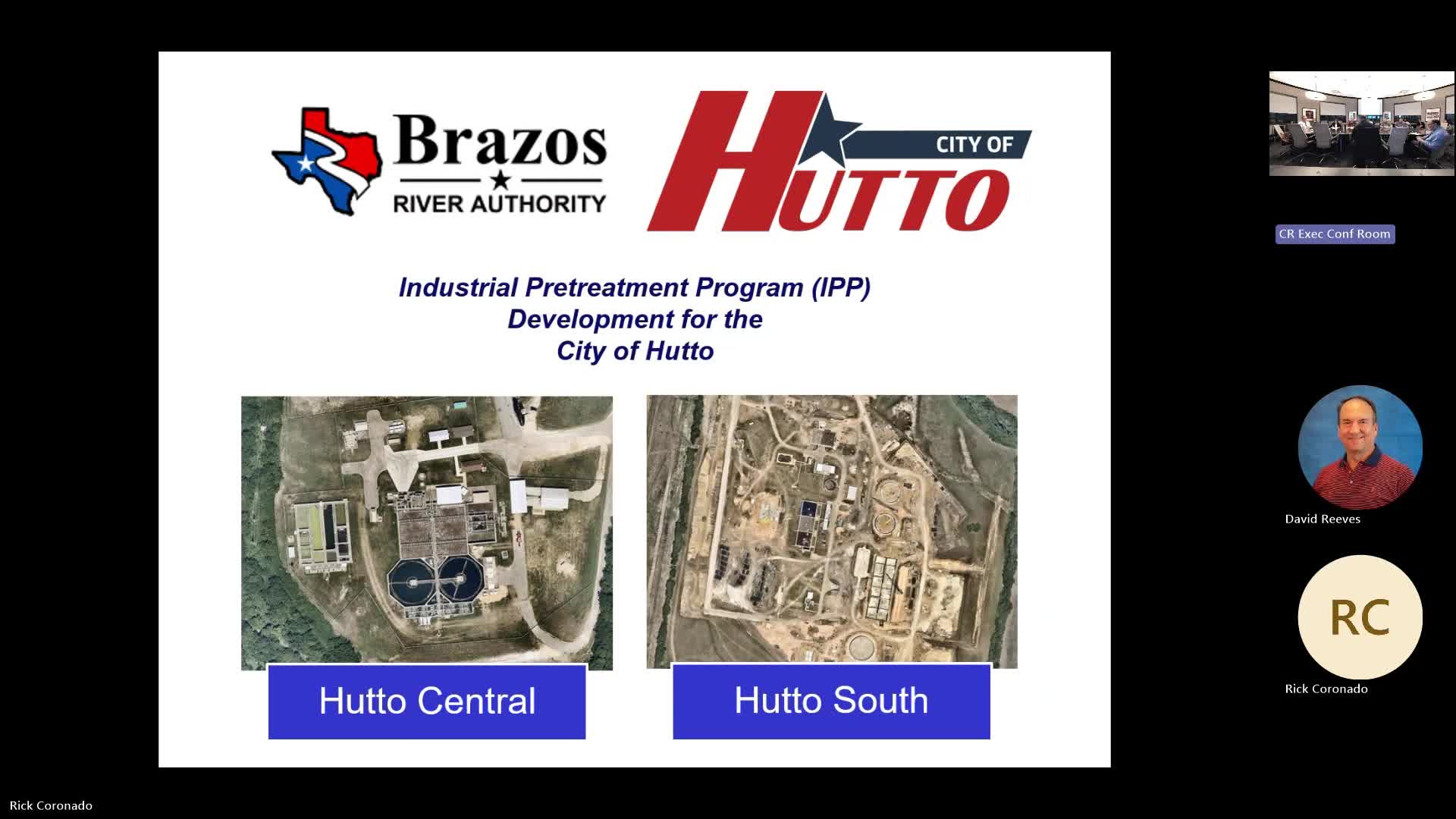Hutto council reviews overhaul of industrial pretreatment ordinance ahead of Hutto South expansion
Get AI-powered insights, summaries, and transcripts
Subscribe
Summary
HUTTO, Texas — City staff and representatives from Brazos River Authority on Nov. 6 presented a proposed full replacement of Article 26.06 of Hutto’s industrial waste ordinance, saying the draft is intended to meet TCEQ program approval requirements and to give the city clear authority to regulate nonresidential wastewater discharges.
HUTTO, Texas — City staff and representatives from Brazos River Authority on Nov. 6 presented a proposed full replacement of Article 26.06 of Hutto’s industrial waste ordinance, saying the draft is intended to meet Texas Commission on Environmental Quality (TCEQ) program approval requirements and to give the city clear authority to regulate nonresidential wastewater discharges.
"The city's current industrial waste ordinance does not meet the minimum requirements for state approval," said Troy Zwarteman, a Brazos River Authority representative, during the presentation to the Hutto City Council. Zwarteman and BRA colleagues described the ordinance as a foundation for permitting, monitoring and enforcement.
The draft ordinance would apply to all nonresidential discharges to Hutto’s sewer system but would require formal permits only for defined categories: significant industrial users (those discharging more than 25,000 gallons per day), categorical industrial users (operations listed under federal regulations) and any user with a reasonable potential to adversely impact the wastewater system. "While not all users will require a permit this ordinance will apply to all non residential discharges to the sewer system," Zwarteman said.
City and BRA staff laid out how the proposed ordinance is structured: general provisions and definitions; pretreatment standards to prevent pass-through or interference at treatment plants; user screening, permitting and sampling requirements; inspection and right-of-entry authorities; enforcement and affirmative defenses; confidentiality for proprietary process data; and extraterritorial jurisdiction provisions for neighboring municipalities that discharge to Hutto’s system.
Presenters emphasized the ordinance’s role in protecting public health, downstream waters and major capital investments. BRA staff noted ongoing capital projects and planning at the city’s treatment facilities, including what presenters characterized as a large expansion at Hutto South. Daniel Patel, a BRA staff member, said the program also protects against increased sludge contamination and higher disposal costs.
Staff described a five-task program timeline: (1) an industrial-user survey and site visits (already completed for a subset of businesses), (2) the ordinance draft presented to council, (3) program support documents (permit templates, enforcement response plan and standard operating procedures), (4) an independent technical assessment to set local pollutant limits for the plants, and (5) submission to TCEQ for program approval and implementation.
Council members asked about technical and practical details. BRA recommended that task 4, the technical assessment that defines site-specific local limits and other numeric standards, be performed by an independent engineering firm rather than the contracted operator. Council also asked whether future wastewater reuse would change limits; BRA said reuse could require lower discharge concentrations and that such outcomes are what the technical assessment would evaluate.
Presenters described baseline influent monitoring already under way at both plants — quarterly scans for roughly 200 parameters — to detect changes when new users connect. Staff said the city sent surveys to roughly 30–35 businesses earlier in the year and followed with site visits to about 10–15 facilities to gather process information and identify potential permit needs.
The draft ordinance reserves, but does not enable, acceptance of hauled septic waste at treatment plants; presenters said Hutto does not currently receive hauled wastewater for disposal and left that section to be activated only if the city decides to accept hauled waste in the future.
On enforcement, the draft includes administrative, civil and judicial remedies. BRA and city staff said that in similar programs most compliance issues are resolved with administrative notices and corrective actions, but the ordinance contains authority for civil penalties, injunctive relief and criminal prosecution in serious cases. Council discussed how police would be engaged for citations and whether Hutto would establish an administrative court process for ordinance violations. Staff said mature programs commonly add an industrial pretreatment officer to manage compliance and that enforcement often escalates from notices to civil or criminal remedies only rarely.
Council members urged staff to distribute the draft to industrial users for comment and to resolve a small number of legal edits flagged by city legal (notably, language about timing/deadlines and the city’s use of "may" versus "shall"). Staff said they would incorporate council feedback, finalize program templates, and pursue the independent technical assessment before submitting the program to TCEQ. No formal council vote or ordinance adoption occurred at the meeting.
